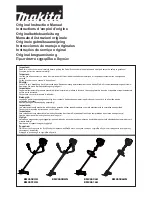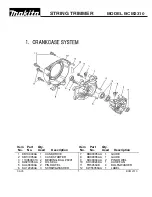
A
MANUAL DE INSTRUCCIONES
INSTRUCTIONS MANUAL
RE EL1 LE3
Dimensiones
1 módulo de anchura
Tª Funcionamiento
0ºC ~ +40ºC
Grado de protección
IP20 según UNE20324
De acuerdo a la Norma
UNE EN 60669-2-1
ES
REGULADOR UNIVERSAL CON MANDO ROTATIVO
ESPECIFICACIONES TÉCNICAS
CARACTERÍSTICAS
Regulador modular válido para el control de:
· Lámparas LED 230V regulables a principio de fase (leading-edge): LED1.
· Lámparas LED 230V regulables a final de fase (trailing-edge): LED2.
· Lámparas LED 12V regulables con transformador electrónico: LED2.
· Incandescencia y Halógenas 230V: LED2.
· Halógenas 12V con transformador electrónico: LED2.
Por el contrario, no es válido para el control de:
· Lámparas LED no regulables.
· Lámparas LED 12V o Halógenas 12V con transformador ferromagnético.
Formato modular, montaje en carril DIN.
Control con pulsador o a través del potenciómetro del frontal (B).
Admite hasta 3 pulsadores luminosos y un número ilimitado de no luminosos.
El potenciómetro frontal (B) permite realizar una regulación desde el propio aparato, sin
necesidad de un pulsador exterior.
El selector (A) permite seleccionar el nivel mínimo de regulación. De esta forma, se puede
evitar que, a niveles bajos de regulación, las lámparas parpadeen o parezcan estar apagadas.
Posibilidad de configuración Maestro/Esclavo, lo que permite:
· Ampliar la potencia regulada, conectando varios reguladores en paralelo.
· Controlar el regulador mediante mando a distancia y un interface:
RC KNX 001 + CO KNX 001
.
Protegido frente a cortocircuitos y sobrecargas. Incorpora una protección térmica que
apagará las lámparas en caso de sobrecalentamiento del regulador.
DESCRIPCIÓN
Selector A: modo de regulación y nivel mínimo de regulación
Este regulador, realiza una regulación a principio de fase (LED1) o a final de fase (LED2),
en función de la posición del selector (A), el cual debe ser colocado correctamente teniendo
en cuenta el tipo de carga conectado.
Es muy importante posicionar correctamente el Selector A para evitar la rotura del regulador
o de las propias lámparas.
Para asegurarse qué tipo de regulación admite su lámpara LED, y posicionar correctamente
el selector, revise las características de la lámpara o consulte con el fabricante de la misma.
Además, este selector aporta una segunda función, permitiendo ajustar el nivel mínimo de
regulación en ambos modos:
· “-”: nivel mínimo de regulación bajo.
· “+”: nivel mínimo de regulación alto.
De esta forma, se puede evitar que, al nivel de regulación mínimo, las lámparas parpadeen
o den la impresión de estar apagadas.
Potenciómetro B: mando de regulación
Permite realizar una regulación de las lámparas desde el propio aparato, sin necesidad de
instalar un pulsador exterior.
También posibilita el poder fijar un nivel permanente y anular el resto de ordenes de control.
Tecla C: modo de funcionamiento
Se dispone de 3 modos de funcionamiento, los cuales cambian según se pulsa la Tecla C:
· Memoria (indicador D en rojo permanente): una pulsación corta enciende las lámparas
al nivel de regulación ajustado antes de haber apagado la última vez.
· No Memoria (indicador D apagado): una pulsación corta enciende las lámparas al máximo.
· Auto (indicador D haciendo 2 destellos): una pulsación corta encenderá las lámparas al
nivel de regulación ajustado antes de haber apagado la última vez. Además, si hay un
corte de alimentación, al restablecerse el mismo, las lámparas volverán al mismo estado
que tenían antes de haberse quedado sin los 230V.
Carga
Lámparas LED 230V a principio de fase
Lámparas LED 230V a final de fase
Lámparas LED 12V con transformador electrónico
Incandescencia y Halógenas 230V
Halógenas 12V con transformador electrónico
Válido para...
Lámparas LED regulables,
Incandescencia y Halógenas
Consumo
3VA
Tensión Alimentación
230V~ 50Hz
Pulsadores luminosos
Máx. 3
Nivel de regulación mínimo
Ajustable
Control
Pulsador o Potenciómetro frontal
4 ~ 80W
4 ~ 300VA
300W de transformador:
6 trafos de 50W y 1lamp/trafo
3 trafos de 100W y 1lamp/trafo
15 ~ 300W
20 ~ 300W
LED1
LED2
Mem
C
B
D
ATENCIÓN: ¡Tensión peligrosa!.
¡Los trabajos con equipos eléctricos en la red de 230V, deben de
ser realizados exclusivamente por técnicos cualificados!.
¡Desconecte la tensión de red antes de proceder al montaje,
desmontaje o manipulación del equipo eléctrico!.
(*) Se recomienda dejar libre, al menos, un módulo de separación entre el regulador y otros elementos del cuadro.
Dimensions
1 module, 17,5mm wide
Working temperature
0ºC ~ +40ºC
Protection degree
IP20 according to EN60529
According to the Standard
EN 60669-2-1
GB
UNIVERSAL DIMMER WITH ROTARY KNOB
TECHNICAL DATA
CHARACTERISTICS
Modular dimmer valid for the control of:
· 230V LED lamps dimmable by leading-edge: LED1.
· 230V LED lamps dimmable by trailing-edge: LED2.
· 12V dimmable LED lamps with electronic transformer: LED2.
· Incandescence and Halogens 230V: LED2.
· 12V Halogen lamps with electronic transformer: LED2.
Otherwise, it is not valid for the control of:
· Non-dimmable LED lamps.
· 12V LED lamps or 12V Halogen lamps with inductive transformer.
Modular housing, 35mm DIN-rail mounting.
Control by pushbutton or by its built-in rotary knob (B).
Can be connected up to 3 lighted pushbuttons and an unlimited number of non-lighted.
The rotary knob (B) allows a dimming from the device, without the need of an external
pushbutton.
The selector (A) allows to select the minimum dimming level. In this way, lamps can be
prevented from blinking or to be switched-off at low dimming level.
Master/Slave configuration, which allows:
· Extend load capacity by connecting several dimmers in parallel.
· Control the dimmer wirelessly through an interface:
RC KNX 001 + CO KNX 001
.
Protected against short-circuit and overload. It incorporates a heating protection that will turn
the lamps off in case of overheating of the dimmer.
DESCRIPTION
Selector switch A: dimming mode and minimum dimming level
This dimmer can control the lamps by leading-edge (LED1) or trailing-edge (LED2),
depending on the position of the selector switch (A), which must be placed taking into
account the connected type of load.
It is very important to place correctly the selector switch A avoiding damaging the dimmer or
the lamps.
In order to know which type of dimming technology accepts your LED lamp, please check
the characteristics of the lamp or consult its manufacturer.
Besides, this selector switch has a second function, allowing to set the minimum dimming
level in both working modes:
· “-”: minimum dimming level low.
· “+”: minimum dimming level high.
In this way, it can be avoided that at the minimum dimming level the lamps blink or appear to
be off.
Rotary knob B: dimming potentiometer
It allows to control the lamps from the dimmer, without the need to install an external
pushbutton.
It also can set a fixed dimming level and cancel other control orders.
Key C: working mode
Three working modes are available, which change as the Key C is pressed:
· Memory (LED D switched on in red): a short press will switch the lamps on to the same
level they have before the last switching-off.
· No Memory (LED D switched off): a short press will switch the lamps on at maximum.
· Auto (LED D blinks twice): a short press will switch the lamps on to the same level they
have before the last switching-off. Besides, if the mains supply is cut-out, when it is
restored the lamps will return to the same state they had before they were switched-off.
Load
230V LED lamps dimmable by leading-edge
230V LED lamps dimmable by trailing-edge
12V LED lamps with electronic transformer
Incandescence & 230V Halogens
12V Halogens with electronic transformer
Valid for...
Dimmable LED lamps,
Incandescence & Halogens
Consumption
3VA
Power supply
230V~ 50Hz
Lighted pushbuttons
Up to 3
Minimim dimming level
Adjustable
Control
Pushbutton or built-in rotary knob
4 ~ 80W
4 ~ 300VA
300W of transformer capacity:
6 transfo x 50W & 1lamp/transfo
3 transfo x 100W & 1lamp/transfo
15 ~ 300W
20 ~ 300W
(*) Keep a distance of at least one module gap between the dimmer and other devices of the cabinet.
WARNING: Hazardous voltage!.
Work with electrical equipment on the 230V mains must be carried
out only by qualified technicians!.
Switch off the mains before installing, removing or handling of
electrical equipment!.




















